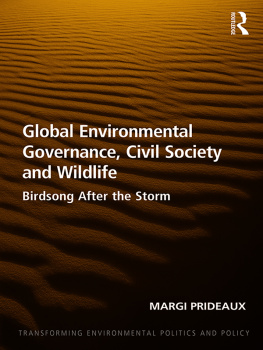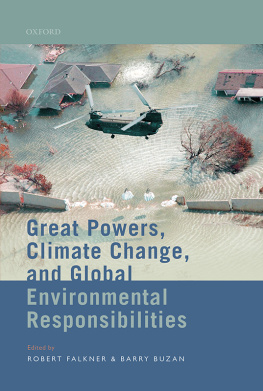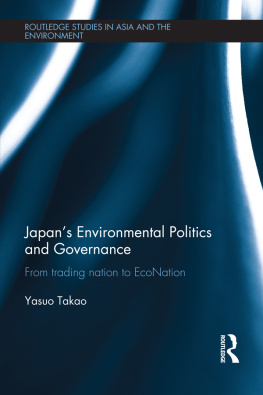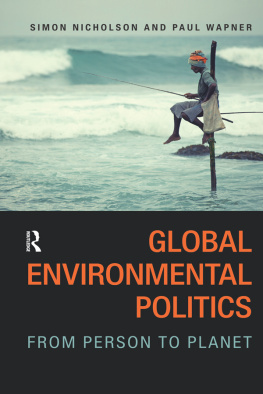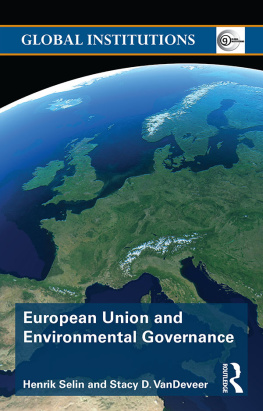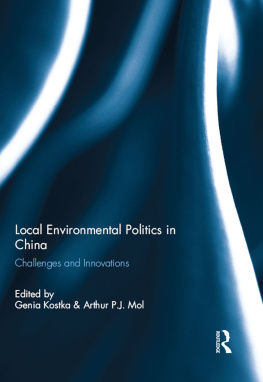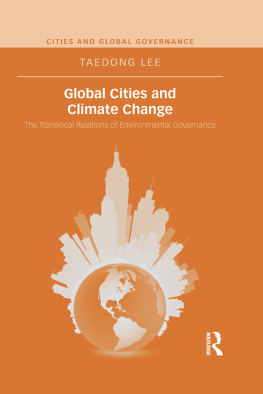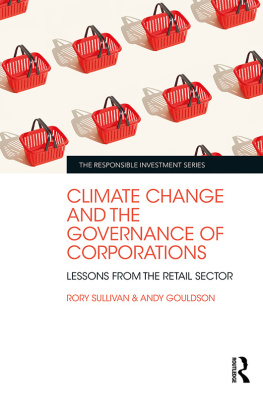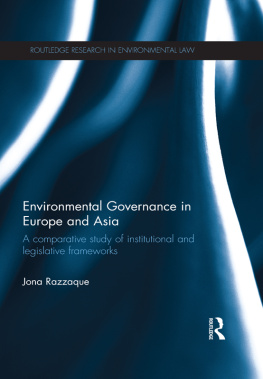Global Environmental Governance, Civil Society and Wildlife
The world is entering a period of unprecedented environmental and political change. By mid-century, climate change will cause dramatic ecosystem shifts. Hundreds, if not thousands, of species will disappear from the earth including icons like polar bears, gorillas, Asiatic lions and bluefin tuna. For many cultures species are place. As our cultivated global community erodes, international triage decisions about species and local ecosystems will commence and if we are not alert, these decisions will be made on our collective behalf, without local perspective or accountability. Global Environmental Governance, Civil Society and Wildlife illuminates a clear pathway for the environmental, nongovernmental community to transition into a co-governance role. Many NGO diplomats have deeper experience and more technical knowledge about policy discussions than their government counterparts and are unburdened by sovereign constraints. The book puts forward the perspectives of developing world civil society and the case that it must play a more significant role in future decision making. Civil society from around the world must be welcomed by governments at the global environmental governance table if we are to hear birdsong after the storm.
Margi Prideaux is a specialist in wildlife policy development. She has a PhD on the development of wildlife policy and law. Dr Prideauxs research focus is on international policy relating to migratory species conservation, regional agreement development, marine protected areas and the role of local and global civil society in track one and track two international diplomacy. She has participated in more than 20 different international processes, has worked with a number of international conservation organisations and has served as Marine Policy Advisor to the Convention on Migratory Species (CMS). Dr Prideaux is the Policy Director for Wild Migration, a Research Associate with the Indo-Pacific Governance Research Centre and a Member of the Joint IUCN SSC/ WCPA Marine Mammal Taskforce and the IUCN WCPA Transboundary Conservation Specialist Group. She writes at www.wildpolitics.co
An extraordinary book responding with experiential brilliance to the violent storm raging across the whole of planet earth. Writing with the deep knowledge of a scholar, the engaged fervor of a veteran activist, and the wisdom of a poetic visionary Margi Prideaux has produced an inspiring text for our time enlivened by its focus on the frightening ordeal we humans inevitably share with the animal wonders of nature also entrapped in this predatory capitalist world. Without exaggeration, a thrilling and indispensable guide to the future.
Professor Richard Falk, Albert G. Milbank Professor Emeritus of International Law at Princeton University and Fellow of the Orfalea Center of Global Studies at the University of California, Santa Barbara. Author of Power Shift: On the New Global Order; and (Re)Imagining Humane Global Governance. USA.
This work by Dr Prideaux, Global Environmental Governance, Civil Society and Wildlife, is the exemplar of what happens when you combine two decades of cutting edge conservation at the practical level by a leading NGO, and critical thinking of what solutions, at the theoretical level, to some of the most pressing problems of our generation are required. This book is radical. From the personal journeys at the micro level, to the clashing of states at the macro level, this work will make you think as philosophy, politics and law are all tightly weaved into a convincing narrative. This is an excellent piece of scholarship.
Professor Alexander Gillespie, University of Waikato. Author of International Environmental Law, Policy and Ethics; and Conservation, Biodiversity and International Law. New Zealand.
Global Environmental Governance, Civil Society and Wildlife offers a call to action. It powerfully makes the case for expanding the parameters of governance beyond states and corporations to include an enhanced, energized, networked civil society capable of caring for local communities and the more-than-human world. Marrying a scholars analysiswith a poets sensitivity, the book is essential reading for understanding both the constraints and opportunities for creating a more just and ecologically vibrant world. Given that the stakes involve nothing less than the life-support system of the planet, we would be wise to heedMargi Prideauxs deep understanding and astute counsel.
Professor Paul Wapner, American University. Author of Living through the End of Nature: The Future of American Environmentalism. USA.
Margi Prideauxs career of civil society activism gives her profound insights into why so many well-meaning international conservation efforts are failing so many communities and so many species. Her spirited and brave call for truly collaborative governance with local communities deserves a full airing in the boardrooms of the big NGOs.
Professor Peter Dauvergne, University of British Columbia, Canada.
In this learned and passionate book, environmentalist Margi Prideaux has an indispensable message: a vast ecological storm is coming, and global governance is failing meet it. At once a window onto civil society and a critique of elite diplomacy, this book's powerful call for a new earth-centred democracy cannot be ignored.
Professor Anthony Burke, UNSW, Australia.
Clearsighted, passionate and inspiring, Margi Prideaux has written a vital reimagining of the destiny of environmental activism. Global Environmental Governance, Civil Society and Wildlife is a clarion call for civil society to step forward and demand greater power. This important and wise book will reshape the thinking of activists, environmentalists, NGOs and policy makers.
Micah White, author of The End of Protest, USA.
Dr Prideauxs life time of work as an environmentalist and community advocate has been combined in this extraordinary book. Passionate, compelling and inspiring. The beautifully told unique stories of people and place and the pathways to the conclusions are compelling and empowering. At a time of global unease with leadership and governance, it challenges the norm and gives hope for the future. It is a book that will stay with you long after you have finished reading.
Jayne Bates, OAM, Former Mayor, Kangaroo Island Local Government, Australia.
A poignant, inspiring, empowering and timely book that shines light on the global conservation issues of our time. It closed the gap between academia and grassroots conservation efforts offering a true insight into the world of those fighting tooth and nail to save our planet. I learned of effort, struggle, triumphs, political and social challenges, but most of all I learned there is hope. This is an outstanding book, written by an extraordinary woman.
Donna Mulvenna, author Wild Roots Coming Alive in the French Amazon, French Guiana.
Global Environmental Governance, Civil Society and Wildlife: Birdsong After the Storm is a wake-up call on all who are concerned about naturess gift to humanity. The use of birdsong is a metaphor for action. The book is a must read by all nature lovers at all levels.
Alfred Oteng-Yeboah, Former Chair of the Standing Committee of the United Nations Environment Programme/Convention on Migratory Species, Germany/Ghana.
Margi Prideaux has done more than anyone to raise awareness of the need for grassroots voices to be heard in debates over nature, climate change and the environment. She deserves to be widely read.
Michael Edwards, Editor of Transformation, USA.
Transforming Environmental Politics and Policy
Series Editors

